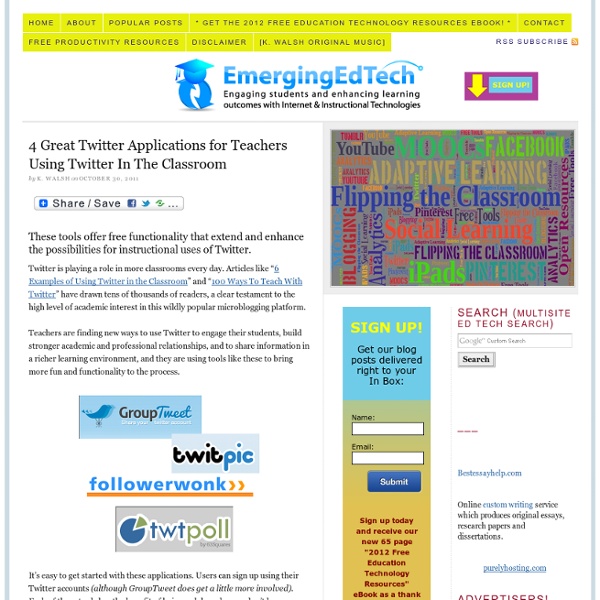Utiliser Twitter pour communiquer, échanger, en pédagogie… (dossier complet)
Le site de référence Docs pour Docs (professeurs documentalistes en CDI) a mis à jour début février 2012, sa page de ressources documentaires, tutoriels Twitter sous l’intitulé générique : Twitter et documentation : suggestions d’utilisation au CDI. Ce dossier constitue un vademecum des possibilités d’utilisation du réseau social Twitter au sens large : que ce soit pour de la veille, pour signaler de nouveaux contenus publiés (sur des blogs ou sites), dans un objectif de communication ou d’échanges voire de collaboration. Est également abordé Twitter comme outil pédagogique. Ce dossier comprend des tutoriels Twitter, des exemples de pratiques, des liens vers des outils utiles qui peuvent simplifier et optimiser l’utilisation de Twitter au quotidien, des présentations, des comptes Twitter recommandés (dont le compte Netpublic), articles récapitulatifs… Bref, une pléiade de ressources pour prendre en main et savoir utiliser Twitter.
Stealthy Trick Makes Facebook Look Like an Excel Spreadsheet
Now you can get away with cruising around Facebook at work, even when your boss is peering over your shoulder. Well, as long as the boss doesn't look too closely. Even the laziest slacker can look busy in a jiffy with this interactive adaptation of many of Facebook's functions. Simply go to HardlyWork.in, click "Gimme Dem Spreadsheets," enter your Facebook credentials, and there's your Facebook newsfeed, all done up to look exactly like an Excel spreadsheet. It's not just a static graphic, either — HardlyWork.in lets you search for Facebook friends by entering names into the formula bar, load more items, check your newsfeed, wall, or tag photos, hover to see who liked a post, and there's even a boss switch (the spacebar) that immediately changes everything into a vast sea of spreadsheet numbers all nestled within their legitimate-looking cells. The only thing missing? Don't be surprised if there's a lot of spreadsheet "work" going on when you report back to the office on Tuesday.
Wiki, blog et traitement de texte en ligne : quel outil pour quel usage pédagogique ?
Le wiki, le blog et le traitement de texte en ligne sont trois outils dédiés à la rédaction. Comment ne pas prendre l'un pour l'autre ? Ou comment ne pas se servir de l'un à la place de l'autre ? Deux questions auxquelles essaie de répondre le Dr Mark Wagner, auteur du blog Educational Technology and Life. Pour ce faire, il établit une comparaison de ces trois dispositifs ; laquelle comparaison porte sur six points principaux que sont : le ou les auteur (s)les collaborateursl'organisationles mises à jourles avantagesles inconvénients. Question de choix S'agissant des auteurs, par exemple, le billet de blog est généralement rédigé par une personne même si le blog lui-même peut être animé par plus d'une personne. Les visiteurs d'un blog ont un rôle restreint, celui de poster des commentaires. En matière d'avantages, les trois outils se disputent la vedette. Le wiki, le blog et le traitement de texte en ligne ne sont pas sans défauts, liés pour la plupart aux limites technologiques.
1512564 1385471268376774 1058665189 n
Top Twitter Hashtags for Teachers
Hashtags are a great way of searching for tweets in a specific category from the whole of the Twitterverse – search for #ukedchat and you will come up with a huge stream of tweets which have been tagged as interesting to anyone wanting to read about UK education. As well as searching for tagged tweets, you can tag your own tweet to make sure you are talking to an interested audience that extends beyond your followers. You can tag absolutely any word on Twitter so it can sometimes be difficult to sort the wheat from the chaff. I have read dozens of lists of ‘useful’ hashtags where many of the tags have never been used more than a handful of times. Not useful in my book. By talking to my followers and noting which hashtags are most often used by the tweeters I follow I have compiled a list of hashtags which I think will all be of interest to UK Teachers though many extend far beyond the UK. General Education Hashtags #ukedchat – UK Education. Technology Subject Specific Specific Areas / Roles
Requiem - yongguk zelo himchan jongup bap daehyun youngjae
Characters Yongguk, Zelo, Himchan, Youngjae, Daehyun, Jongup Description The story of 6 lives that become effortless tangled with one another under the means of a government assignment. Through this, they will find sadness, happiness, love, and loss. Pairings: Jongup+Himchan, Yongguk+Zelo, Daehyun+Youngjae Foreword Requiem has garnered a lot of attention since its start three months ago. And for new readers, discovering this story just now, thank-you! It should be noted to new readers that this story is over 110,000 words, and over 200 pages. So, please enjoy, and be sure to tell me what you think! Poster made by nolimitxinfinite over at Bunny Confectioneries!
Carnets québécois de pédagogie critique
BIGBANG Official Site



